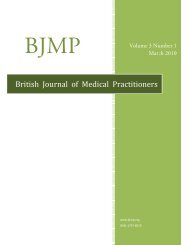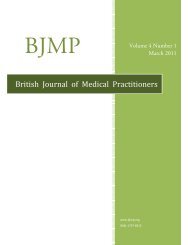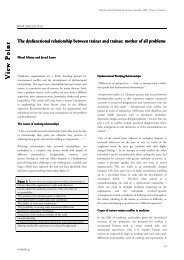R esearch A rticle - British Journal of Medical Practitioners
R esearch A rticle - British Journal of Medical Practitioners
R esearch A rticle - British Journal of Medical Practitioners
Create successful ePaper yourself
Turn your PDF publications into a flip-book with our unique Google optimized e-Paper software.
<strong>British</strong> <strong>Journal</strong> <strong>of</strong> <strong>Medical</strong> <strong>Practitioners</strong>, March 2013, Volume 6, Number 1<br />
BJMP 2013;6(1):a601<br />
R<strong>esearch</strong> A<strong>rticle</strong><br />
Evidence and recovery; improving outcomes in opiate substitution treatment<br />
James Bell, Christine Healey, Fiona Kennedy, Mohammad Faizal and Aadil Jan Shah<br />
Abstract<br />
Background: Based on the perception that many patients on methadone are not receiving effective treatment, drug policy in the UK is being reoriented<br />
towards the ‘recovery agenda’ 1 .<br />
Aim: To assess the extent to which current delivery <strong>of</strong> OST is evidence-based, and whether bringing treatment into line with evidence improves outcomes.<br />
Method: Clinical audit in two OST services in Merseyside. Non-responding patients - those reporting regular heroin use in treatment - were identified<br />
from files, and patients in one service were referred for medical review to bring their treatment into line with current UK guidelines 2 – predominantly,<br />
ensuring adequate methadone doses. Patients in the other clinic continued to receive treatment as usual. Files were re-audited 9 months later and rates <strong>of</strong><br />
heroin use between the clinics compared.<br />
Results: 175 (17% <strong>of</strong> patients in treatment) reported regular heroin use; most were on less than 60mg/day <strong>of</strong> methadone. Although reporting high<br />
depression scores and low quality <strong>of</strong> life, patients resisted changes to their treatment; <strong>of</strong> 104 patients referred for medical review, only 47 attended. <strong>Medical</strong><br />
review and changes to treatment were seen as an intrusion into patients’ choices. At follow up audit, there was no difference in reductions in heroin use<br />
between the two OST services.<br />
Conclusion: Many non-responders appeared “stuck”, but resisted change. The clinical ethos was oriented towards supporting clients in their choices rather<br />
than achieving specific treatment objectives. By focusing on outcomes rather than process, the ‘recovery agenda’ may facilitate the implementation <strong>of</strong><br />
evidence based care, as opposed to being a competing paradigm.<br />
KEYWORDS : opiate substitution treatment, recovery agenda, optimisation clinic, audit, evidence-based care.<br />
Introduction<br />
Driven by a global rise in opioid dependence, Opioid<br />
Substitution Treatment (OST), the prescribing <strong>of</strong> opioids<br />
(usually methadone or buprenorphine) as maintenance<br />
treatment, has expanded worldwide over the last two decades 3 .<br />
Participation in OST reduces the risk <strong>of</strong> death by overdose 4 ,<br />
reduces the risk <strong>of</strong> HIV transmission 5 and reduces participants’<br />
involvement in property crime 6 . For these reasons, maintenance<br />
with methadone remains the major public health response to<br />
reduce the harms caused by heroin addiction.<br />
In the United Kingdom (UK) in the late 1990s, government<br />
funding to expand access to OST was provided, with the<br />
explicit objective <strong>of</strong> reducing crime 7 . The expansion <strong>of</strong><br />
treatment was supported with clinical guidelines 2 , and targets<br />
were set to try to ensure good outcomes. Given the r<strong>esearch</strong><br />
evidence on the importance <strong>of</strong> retention in producing better<br />
outcomes, service providers were set a target <strong>of</strong> retaining at least<br />
75% <strong>of</strong> people in treatment for 3 months. A tool to monitor<br />
outcomes, the Treatment Outcomes Pr<strong>of</strong>ile (TOP) 8 , was<br />
developed and service providers nationally were set a target <strong>of</strong><br />
80% <strong>of</strong> people in OST completing TOP at entry and after 6<br />
months 9 . This 20-item self-report questionnaire records a set <strong>of</strong><br />
core data for the previous 28 days, including the number <strong>of</strong><br />
days on which heroin and cocaine have been used.<br />
The amount <strong>of</strong> methadone prescribed in England and Scotland<br />
increased fourfold over the decade 1998 – 2008 3 . However, in<br />
2010, Britain’s newly-elected government signalled a change in<br />
the direction <strong>of</strong> drug policy 1 . The paradigm on which the new<br />
policy is based is “recovery”, a concept embracing self-help,<br />
mutual support, and optimism about the possibility <strong>of</strong> positive<br />
change. The policy is in part driven by the perception that<br />
treatment services have a defeatist attitude, expecting little<br />
positive change – hence the claim that there are too many<br />
patients “parked on methadone”. To counteract this perceived<br />
pessimism, the “recovery agenda” includes incentives to services<br />
to promote abstinence from all drugs including prescribed OST<br />
medication. This policy has been criticized as being inconsistent<br />
with the available evidence 10 , but has been defended on the<br />
grounds that many patients on methadone were doing poorly,<br />
and needed encouragement to make positive changes in their<br />
lives.<br />
In 2010, we decided to investigate to what extent people were<br />
responding poorly to treatment, and whether this could be<br />
improved by implementation <strong>of</strong> evidence-based treatment.<br />
Methods<br />
This quality improvement project was undertaken in two OST<br />
clinics in Merseyside, managing in total over 1000 patients. The<br />
services had the same senior leadership and medical staff, but<br />
BJMP.org<br />
6







